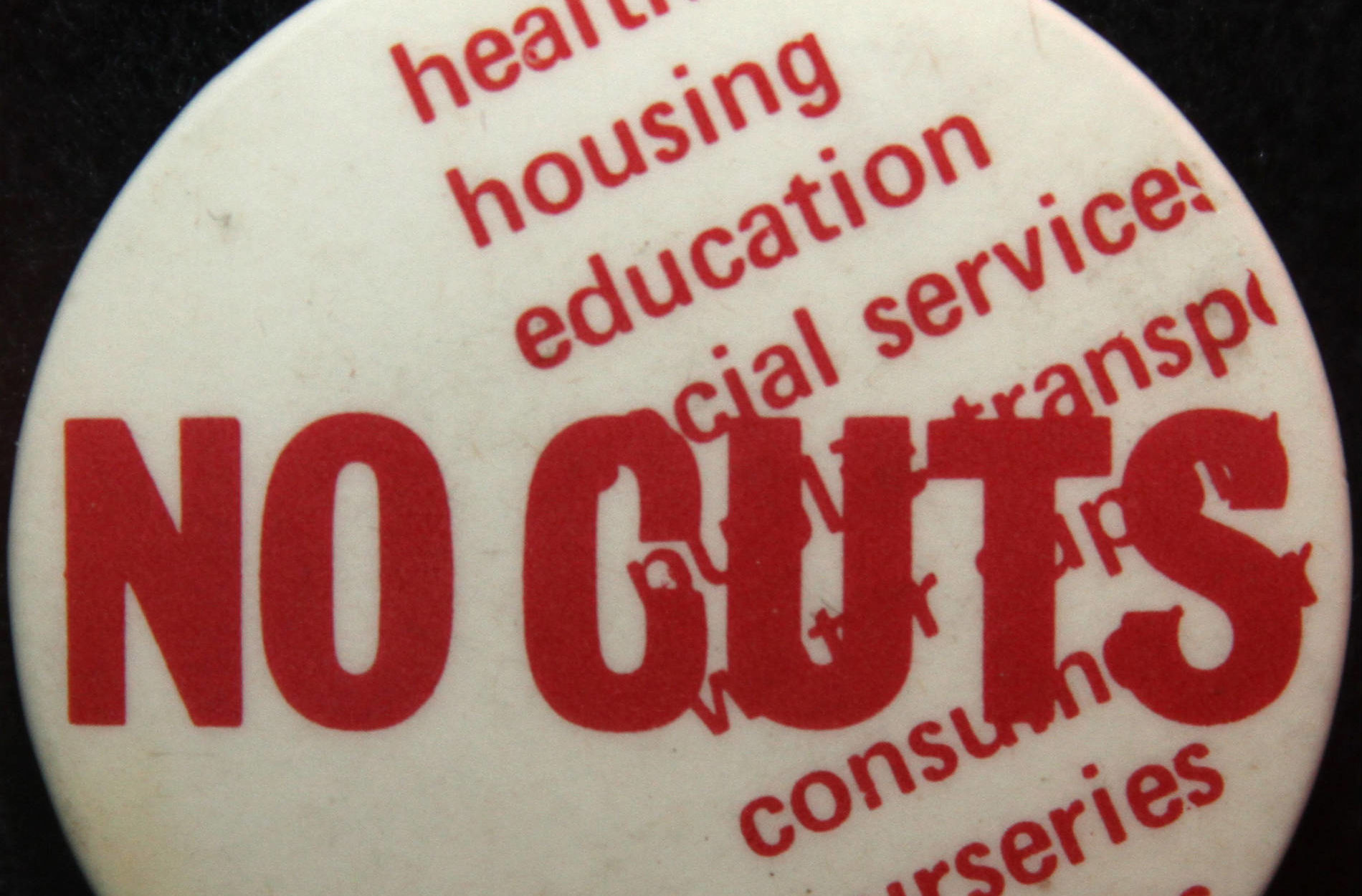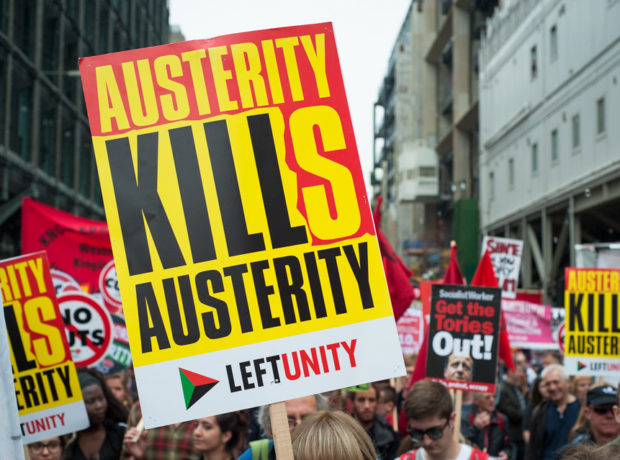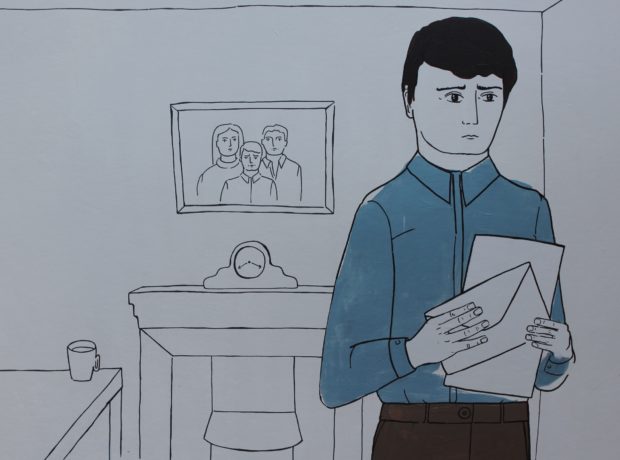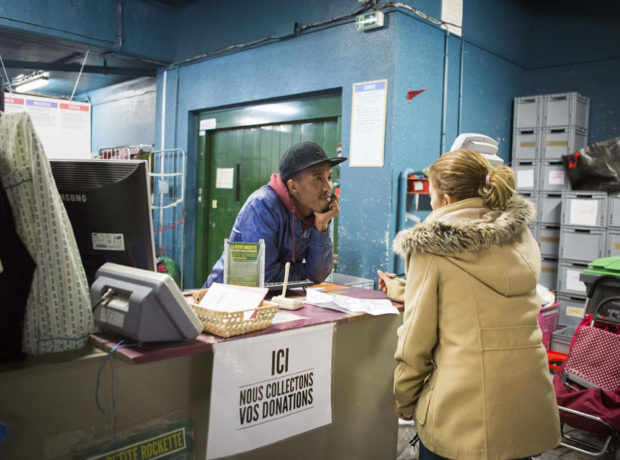The evening of 13th March 2014. It’s drizzly, cold and foggy: an inauspicious night for the inaugural meeting of the shining beacon of anti-austerity politics in Coventry and Warwickshire. The People’s Assembly has come to Coventry.
As we make our way into the meeting hall, we’re greeted by a reception area populated with tables carrying leaflets, badges, and banners from various different organisations: Unite, the National Union of Teachers, the Public and Commercial Services Union, the Coventry Trade Unions Council, the Coventry Socialist Party, Unite Against Facism, Unison. I’ve brought along a friend who knows little about this new movement. Almost as soon as we enter the building he’s accosted by a very earnest man from the Socialist Party. Has my friend considered joining, the man asks and presses a number of leaflets and papers into his hands before launching into a discussion of Marxian economics. My friend is left slightly bewildered and offers to go and secure us seats in the main hall. He looks relieved when I accept.
As the start of the meeting draws closer the tension in the reception area is palpable. The panel of speakers nervously congregate on plastic chairs, discussing the running order for the evening. There are representatives from Disabled People Against the Cuts, Defend George Eliot Hospital, the Public and Commercial Services Union, Coventry Against the Bedroom Tax and the National Secretary of The People’s Assembly. But Owen Jones, founding member of The People’s Assembly, political commentator and author of ‘‘CHAV’s: The demonisation of the working class’ has yet to arrive.
I attempt to interview some of the panellists about their reasons for taking part; with limited success. The panellist from Defend George Eliot Hospital agrees to speak to me, and I draw her away from the others to have a chat in a quieter corner of the reception area. I ask her why she’s involved in the People’s Assembly, what she thinks might distinguish the movement from any other, and to explain a bit more about the situation at George Elliot Hospital. She looks at me in terror.
‘‘I’ve gone blank now..,’ she says. ‘Erm, Nye Bevan gave us the NHS, and I want to be able to pass that free healthcare onto my granddaughter, free healthcare…At the minute we’re going through a procurement process, we’re down to two bidders … erm … you see I forgot. That’s going to happen to me in there, that is’.
Anxious not to exacerbate her nerves further we agree to speak later and I take my seat in the main meeting room.
Fifteen minutes before the designated start time of the meeting and the room is nearing capacity: around one hundred people fill the seats and newcomers are forced to line the edges of the hall, leaning against walls, or sitting on the floor. It’s a diverse crowd, in terms of age, ethnicity and gender. My friend has found us seats two rows from the front, with a direct view of the panel. The room is warm and clammy, and people around us are talking and fanning themselves with the raft of papers left by organisers on every seat. Amongst these papers is a document entitled: ‘‘Declaration of people living and working in Coventry and Warwickshire’’, with a space on the back for attendees to sign. This is the manifesto for the meeting.
‘We people living and working in Coventry and Warwickshire do not accept that the government’s austerity programme is necessary. The banks and major corporations should be taxed at a rate which can provide the necessary resources. We do not accept that Government should take money from those who did not cause the crisis. We oppose those who wish to see the destruction of a universal welfare state. We therefore choose to resist.
We refuse to be divided against ourselves by stories of those on golden pensions or of scroungers of the undeserving poor. We do not blame our neighbours whatever race or religion they may be. We oppose those who seek to blame migrants for problems created by austerity. We stand by our youth, our disabled citizens and retired citizens…
…We do not seek to replace any organisation fighting cuts. All are necessary. We have a plain and simple goal: to make government abandon it’s austerity programme. If not it must be replaced by one that will.
We will concentrate on action not words. We aim to promote maximum solidarity for unions and others taking action building a united movement of resistance.
We fight for an alternative future for this generation and for those that come after us.’’
Around us, others are reading through the papers on their chairs. Many are signing the petitions circulating the room.
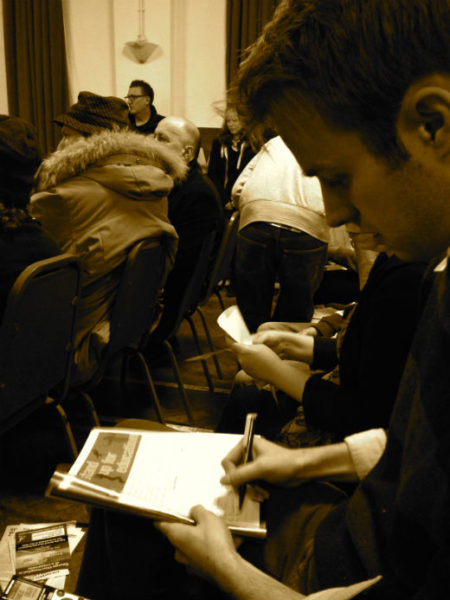
Petition @ People’s Assembly
Suddenly, the chatter gets louder from the back of the hall. Those near the front crane their necks to see what’s happening. Owen Jones has arrived, all smiles, clutching a cup of coffee from the train station. He moves through the crowded room, politely greeting people as he good-naturedly manoeuvres past attendees to reach the panel’s seats at the front of the hall.
People around us murmur: ‘‘Look- it’s Owen!’’ ‘Oh I do like him’ and ‘Isn’t he tiny! He’s much smaller than when you see him on TV’. Whether he likes it or not (and from his demeanour it appears that he doesn’t) he’s the real star of the night. Jones was one of the original signatories to the letter to the Guardian which marked the launch of The People’s Assembly Against Austerity on Tuesday 5 February 2013. Since then he’s toured the country tirelessly speaking at the inaugural meetings of regional branches of the movement.
He now introduces himself to the other panel members before taking his seat next to fellow panellist Sam Fairburn, National Secretary of The People’s Assembly. It’s not long before the chair, Jane Nellist, Secretary of Coventry Trades Council calls order and begins the meeting.
Nellist reports on the latest cuts to Coventry City Council’s budget, cuts which amount to a total of £19million pounds. She says that Councillor Gannon, who’s responsible for the Council’s finances, has gone on record stating that if the cuts continue at this pace there will be no council services provided by 2025.
The next speaker is Sam Fairburn. He appears slightly nervous as he addresses the audience, but soon gets into his stride. Praising the fantastic turnout in the (now overcrowded and increasingly humid) room, he describes the way in which the national movement continues to build: in the past week alone, four new regional People’s Assembly groups have been launched. He explains why the organisation is so vital: “David Cameron, announced last year, speaking from a gold plated podium I might add, that austerity needs to be permanent, regardless of the deficit. Just last month George Osborne announced that we should brace ourselves for a year of hard truths in a speech where he announced £25bn worth of further cuts.”
But Fairburn tells us that living standards have fallen, that we’re now experiencing ‘the longest consistent fall in real wages since records began.’ He quotes a UNITE survey which ‘found that only 18% of workers say that their wage lasts them the entire month.’ ‘It’s no surprise that payday loan companies are seeing record profits and incredibly 9 out of 10 new housing benefit claims come from those in work,’ he says. ‘At the same time as all of this we are told that the economy is recovering, we are told that it’s turned a corner, that it’s growing faster than anybody could have expected, and I think what that says to people is that: “It’s getting better for us up here, but you down there, you deserve austerity”. All this exposes the government’s real agenda which is to fundamentally restructure society to benefit those at the top.’
It’s getting better for us up here, but you down there, you deserve austerity
The crowd murmurs in assent. Fairburn continues.
‘The problem is though, it’s not just this government. All three parties are committed to austerity and that means that meetings like this, that creating a mass movement on the streets is more important than ever and that this mass movement needs to take off very quickly, quicker than ever, because that mass movement is the only thing that is really going to stop austerity in its tracks.’
For Fairburn at least, the solution to austerity lies in collective action. More people need to go back to their communities and recruit others to join them in protesting the cuts and their impact on the vulnerable. What is The People’s Assembly’s role in this? Helping to forge links between the various and fragmented branches of the political left, and coordinating as many people as possible into a national movement. Fairburn says that the biggest challenge for the People’s Assembly is finding the things that the left can agree on:
‘We need to unite around the very few issues that we can all agree on and… form alliances with people in the Labour Party, people in the Green Party, with the Pensioners, with the Students, with those in a Trade Union and with those outside of a Trade Union- it’s on this basis that we need to form this movement.’
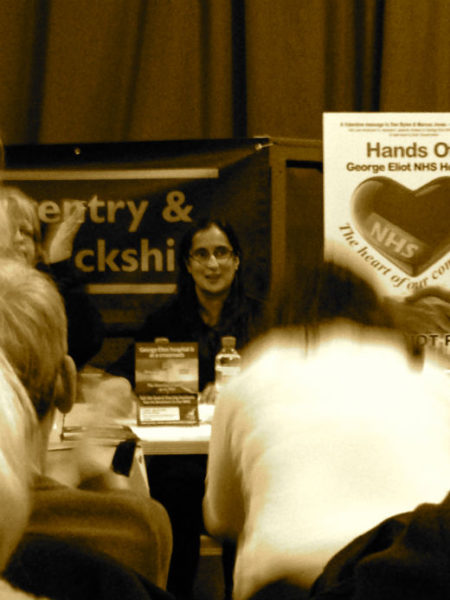
Sofia Azam
As the meeting continues, the details of the impact of austerity driven policies on those who are most vulnerable continue to roll on. Sofia Azam, who’s bringing a case against Ofqual for unfair dismissal, claims that her activities as a Union representative resulted in her being made redundant on spurious grounds. She’s hopeful that the publicity generated by her case will be ‘used to promote healthy and stronger union branches to resist the anti-unionism that is being condoned by the current hostile government.’ She says, ‘It is time to fight back and take the Trade Union to the next level, or risk saying goodbye to everything we have achieved, pay increases, terms and conditions, pensions, all of it.’
Then there are testimonies from Eleanor Lisney, co-founder of Disabled People Against the Cuts, and John Boadle, representing Coventry Against the Bedroom Tax. Lisney illustrates the impact of the austerity driven policies on the disabled:
‘Tom is a wheelchair user. He works part time for a charity. His health does not permit him to work full-time and it’s not easy to get a job if you’re a disabled person anyway, but he manages to have a reasonable life.
‘He lives frugally. He gets disability living allowance, DLA, and he uses it to get a car through Motability, which he uses to get to work. He gets a care package from his council, not much, just enough to help him shower and get dressed for work during the week. He has a two bedroom council bungalow because he needs an accessible home.
‘One day he gets a letter from DWP, ATOS, saying that he needs to be assessed for DLA. They declare that he’s no longer eligible for DLA which means that not only has he not got the money any more but he no longer has his car. So he can’t get to work. He’s not very good at managing buses.
‘He loses his job. His council decides to cut down his care package because of budget cuts. He lives on his own and suddenly he doesn’t know how to cope.
‘He gets put on ESA, but then his adviser says he’s fit to work. He finds it difficult to get to the Jobcentre and doesn’t know how to appeal. He gets sanctioned. He has no money to feed himself or pay his utilities and then they say because he lives on his own … he has to downsize. But … there are no accessible one bedroom flats. And he can’t pay. And he can’t move. He gets depressed, he’s about to be made homeless and he has no idea what to do next. Are we surprised he gets suicidal? Are we surprised that disabled people who are caught in this vicious cycle wish to commit suicide?’
John Boadle offers, if not a solution, then at least a strategy for resistance to the bedroom tax. He argues for non-violent physical resistance to protect residents affected by the tax from eviction. His organisation, Coventry against the Bedroom tax, has established a network of people who are prepared to attend evictions and encircle the property, forming a human barrier against the baliffs (The parallels between this strategy and that advocated by Gulabi Gang in India, featured earlier this year on Lacuna, are striking). The aim is to force council and housing associations to refuse to evict tenants who fall into rent arrears, and in doing so, defy the government. The group has been lobbying Coventry City Council to follow the example of Scotland and use their discretionary housing fund to prevent tenants from being affected by the tax. Whether this strategy will succeed remains to be seen, but it’s the most innovative approach presented so far, and Boadle sits down to applause from the audience.
Finally, the chair turns to Owen Jones. The last speaker of the night in front of a beleaguered, tightly-packed, hot and increasingly uncomfortable crowd, you can’t help wondering if he’ll be able to close the meeting on a positive note. My friend looks at me: ‘I wouldn’t want to be him right now.’
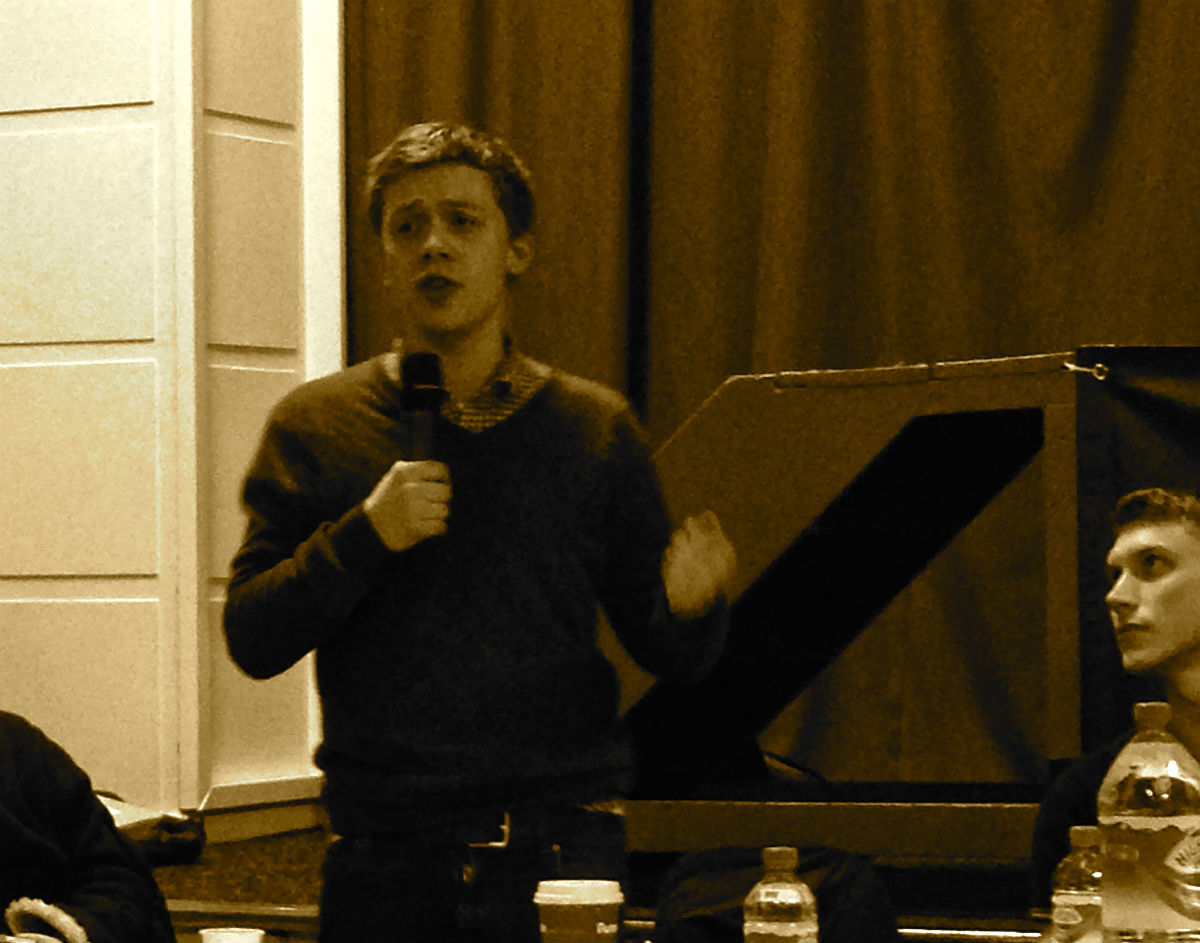
Owen Jones @ People’s Assembly
Jones gets to his feet and begins with a typically self-deprecating joke about his appearance: ‘I know, I look like I should still be on my paper round’. Young he may appear (he is still only 29), but within minutes it’s clear that Jones speaks with the skill, conviction and authority of a seasoned campaigner. In a political landscape increasingly dominated by politicians who move seamlessly from private school to university to Whitehall special advisor to safe political seat, Jones is reminiscent of the politics of a previous era, where individuals, driven by a sense of injustice, honed their skills through spending time campaigning with the people and for causes they wished to represent.
But despite a loyal following, Jones has repeatedly avoided answering questions about whether he would wish to stand for Labour. Having seen him on his feet, it’s difficult to avoid thinking that the party might be stronger for having him as an MP. Not that he would fit terribly well with the current party. Jones speaks the language of socialism. Within the first two minutes he’s praising the value of solidarity. He commends the other speakers for their work, and decries the mainstream press that: ‘ignores alternative voices, and airbrushes the experiences of ordinary people out of existence’ before moving swiftly to discuss the current government.
This is the worst economic recovery,’ he says, ‘not since the 1980’s, not since the 1930’s, but the worst so-called recovery since records began.
‘This is the worst economic recovery,’ he says, ‘not since the 1980’s, not since the 1930’s, but the worst so-called recovery since records began. That’s the point though: those weren’t really the terms that they set themselves. Under the terms they set themselves they’re doing pretty damn well. Because they have used this crisis to push policies they have always wanted to get away with, but didn’t think were otherwise possible.’
At this point the crowd erupts into a chorus of ‘here, here’ and Jones has to pause to wait for the applause to die down. He catalogues the ways in which the current government has used austerity to further their ideological ends: assaults made on the NHS, parts of which have been privatised by the back-door, contracts handed to Tory party donors (such as Care UK, who donated £20,000 to Andrew Lansley’s personal office in the run up to the 2010 election); the dismantlement of the welfare state; tax cuts for the rich, all of which has been made possible by turning a ‘crisis of the market into a crisis of public spending- it is the biggest lie in politics that this crisis was caused by public spending.’
More applause and a standing ovation from the back.
He lists the victims of austerity: working people, women, those on low wages. He says, ‘They earn their poverty, they go out every day to earn it.’ He decries the rude injustice of the expansion of food banks in the sixth richest nation on earth; legal loan sharks who prey on the vulnerable; pay-day loan companies used every month by 1 million families in the UK to pay for rent and service their existing debts; the six and a half million people looking for jobs that don’t exist; zero hour contracts; part time workers desperate for full time work; the housing crisis; private landlords; the five million people on social housing waiting lists; the one in four children in London living in overcrowded housing with its implications for both health and educational attainment; the bedroom tax. His passion and anger is genuine and infectious. The whole room is with him, people sitting up straight, leaning forward in their seats.
‘How do they want to get away with it? When people are struggling in the way that they are? They want to get away with it by perpetuating an agenda of fear. By taking people’s perfectly justifiable anger and turning it away from those who caused this crisis onto their neighbours, onto those living on their streets. They say to those in low paid work, whose tax credits are being withdrawn: ‘don’t get angry with your employer, don’t get angry at us, get angry at the unemployed person on your street, living it up at your expense’.
‘And how does it end? It ends with public money being spent on vans sprayed with slogans that belong on National Front campaign posters, sent round to our proud mixed-race communities. It is the very definition of the politics of divide and rule. They accuse us of the politics of envy when that is exactly what they are trying to perpetuate, they tell us ‘envy the immigrant, envy the public sector worker, envy the unemployed person on your street.’’
Just as the hall is ready to erupt, Jones sets out his agenda for hope: a living wage; regulating the private rental sector; clamping down on pay day loan companies; giving councils the power to build housing; re-nationalising the railways; increasing taxes for the rich; a new politics.
‘Instead of politics being about kicking people at the bottom, and how hard you can kick them, and competing over it, we need politics to be about giving people hope, and we do that by having confidence and being inspired by our ancestors. We learn from our traditions, like the Chartists, the world’s first working class political movement who fought for democracy, like the suffragettes, reviled, persecuted in their day, locked up and force fed, like the early trade unionists who fought for the rights of working people, like the activists who fought against racism and sexism and homophobia, spat at in the street, hit with police batons, locked up, but vindicated by history.
‘We stand on the shoulders of giants. Everything we take as read, everything we take for granted, all our rights all our gains were not given to us by the goodwill and generosity of those above. They were won through the struggle and sacrifice of people from below, and we owe it to our ancestors to not let everything they won at such cost to themselves be stripped away by a government that did not even win the last election.’
It’s a rousing conclusion. Jones sits down to rapturous applause. Around us people are on their feet, cheering and whooping. For the first time in the evening there’s a real sense of a coherent movement, a cause, a manifesto for change.
Jones exits soon after his speech and before long people begin to leave. As we make our way to the car we discuss our impressions of the evening: disappointment at the level of factionalism in evidence; dissatisfaction with the lack of solutions on offer. Undeniably, Jones was the highlight of the evening. Which is perhaps unfortunate given that the point of the People’s Assembly is, in part, to reject the idea of leaders. Maybe though, now more than ever following the deaths of Tony Benn and Bob Crow, that’s what the left needs. If it’s to have any prospect of disrupting the austerity consensus before the next election.
Has anyone got Owen Jones’s number?
